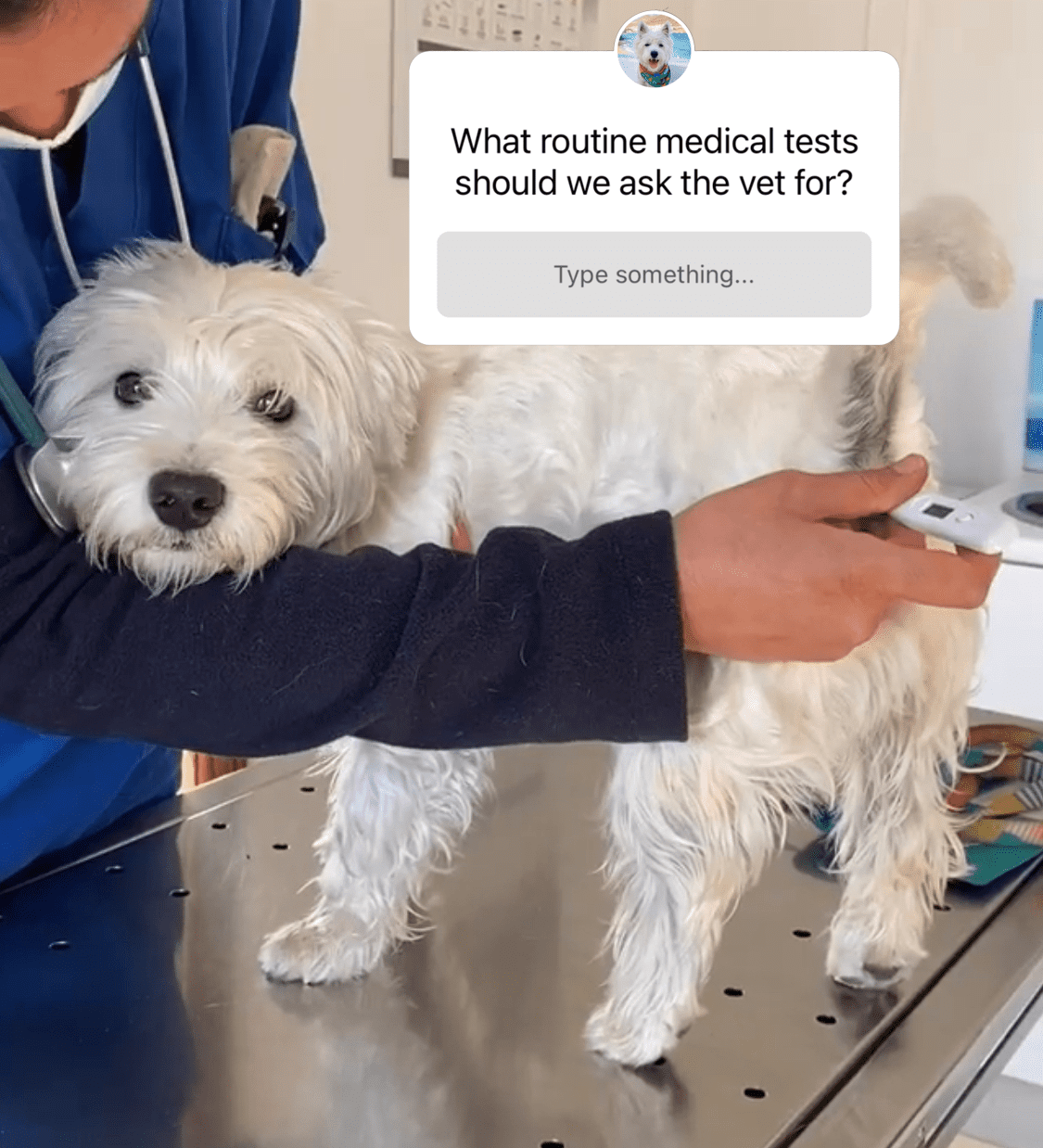This week we took Sami to the vet looking to do a routine check up. No particular reason for that, since he is a healthy pup showing no symptoms of any health issues (aside from his allergies, which we know and keep an eye on).
But Sami is now 3 and a half years old, so he is an adult and I would like to do a full check up every year, just to make sure everything is good and if anything should come up, catching it early is always better.

Honestly, I had some idea of the things I would like to get checked and I was going to discuss it with our vet as well, but I also wanted the opinion of other, more experienced, Westie parents. So I asked our community on Instagram. And the responses were overwhelming (in a good way). The suggestions and stories we got helped me make a list of things I want to get checked to make sure all the common Westie health issues are covered. I am sharing this list with you now.
The list of things I asked our vet to check for our Westie:
- Health book (to make sure all the vaccines and de-worming/tick/flea treatments are up to date)
- Temperature
- Listen to heart and lungs
- Teeth and gums
- Ears
- Eyes
- Anal glands
- Testicles (Sami is intact) and prostate exam
- Legs (especially hips and knees)
- Urine sample for testing
- Blood tests
- Ultrasound and X-Rays to see the liver, kidneys, lungs, heart, bladder
I will talk a little about some of these.
Teeth and gums are very important to check regularly. The color of the gums can indicate a lot about your dog’s health (for example if they are pale, the dog could be sick; if the tongue is too red or too blue it can show lung problems etc). Also, tooth infection is common especially in older dogs, so it needs to be monitored.
I try to brush Sami’s teeth every night before bed, because this makes a difference long term in keeping the teeth clean and gums healthy. Even so, he still gets plaque on his teeth that accumulates from the food. Every few months, we will do a teeth cleaning at the vet which is NOT under anesthesia. The vet just takes a metallic tool and remover the tarter and plaque with it. It takes 5 minutes and Sami is usually calm, but still needs to be held to make sure he doesn’t move suddenly. I know most dogs are not as calm and I also know most vets don’t perform this procedure like this. However, if your pup tends to allow you to look at his mouth and brush his teeth without much complaining, chances are they will accept this too, so you can ask your vet about it.
Ears are important because Westies tend to get ear infections. The vet usually checks ears with a tool that has a light and magnifying glass, allowing them to see inside the ear. Luckily Sami’s ears were never an issue, but every few weeks I clean them at home using a special ear solution (drops) that help the inside of the ear stay clean and dry.
Listening to heart and lungs is very important. Some of the stories people shared with me on Instagram involved a heart murmur (which can be detected doing this check up) and lung problems like pulmonary fibrosis (which I recommend you don’t google, like I did, but just don’t skip yearly check ups).
Testicles. Since Sami isn’t castrated, it’s important to check the testicles for any potential tumors that can appear. The vet checked them manually, but also did an ultrasound to make sure all is ok. However, it is indicated that intact dogs be neutered around an older age (some say 10, my vet recommends 5-6 years old) which we will do.
Prostate. This was checked by doing an ultrasound and all looks good.
Anal glands are usually cleaned every few months for Sami. They do this at the vet or at the groomer’s (if you ask). Each dog has a different cleaning interval (some need it more often than others) but a sign is when your pup starts licking their butt a lot, or rubbing it on the carpet.
Hips and knees are checked manually. The vet moves the joints and pays attention to how they feel. Of course you can also do an X-Ray to be sure, but since there was no reason to worry, we skipped this. However, thanks to our friends on Instagram, I realized that it’s bad for dogs to be jumping up and down the bed and couch – and especially for Westies, who are prone to hip and knee problems. Sami has made a habit of jumping up and down everything (including our high bed) and since he is young, he is very athletic. But in the long run this could be a problem so I decided to avoid that as much as I can, by lifting him up or buying a ramp for him.
Urine. The urine test is important because it can show things like diabetes (or even a tendency to diabetes, which if detected early can be contained). It can also show if the kidneys are functioning well by analyzing the urine density (renal insufficiency has various stages and if your pup’s urine density is too low, there is a chance they might have a start of renal insufficiency).
Urine can also show you if the food you are currently feeding is good for your dog or not. For example, if you are feeding too much protein (which is a trend in dog diets) the kidneys can become overworked and slowly they can become damaged. The urine can also develop struvite crystals which can cause blockages when your dog pees (and can be life threatening).
Unfortunately we’ve been there with Sami, after feeding BARF diet for a few weeks (because everyone said this will help with his skin allergies) and we ended up 3 times in a week with Sami on the vet’s table, with a tube stuck up his urethra, because he couldn’t pee. Turns out, his raw meat diet was changing the PH of his urine, creating the struvite crystals which happened to block the urethra leading to urinary tract obstruction, which means urine is stuck in the bladder and can’t get out. As you can imagine, it’s an emergency and it was lucky that I caught it in time. This lead to me changing Sami’s diet (initially to a treatment kibble to help dissolve the struvite crystals and then towards dry food lower in protein).
Blood test. I asked our vet for a full blood test. This can show you if there is cause of worry about diabetes, tumors, infections in the body, viruses. I don’t know much about the medical aspect (our vet did explain each indicator in detail, but hey, I’m not a doctor!) so this is pretty much the gist of what I got. Thankfully all was good and there was nothing to worry about here.
I also asked for an extra blood test, which is the one for Leishmaniose (aka Leishmaniasis). This is a parasitic disease transmitted by a certain type of fly/mosquito and it’s common in Portugal and South of Europe in general, as well as the tropics. It’s a fatal disease in most cases and we do everything to prevent it through: vaccine, tick-flea-and-mosquito pills and a supplement that helps boost certain cells of his immune system that fight this disease (the supplement is a syrup I give Sami during spring/summer).
Ultrasounds and X-Rays. Normally you don’t need to do these unless there is a reason to worry. I included them in Sami’s check up because I wanted to make extra sure everything is working ok and it was just an extra precaution. I can’t tell you that you need to do these, but doing them can help. The con is, obviously, your vet bill will be more expensive. The pros are: if your dog has any issue that shows in the tests, it’s good that you caught it early. If your dog is 100% healthy, it’s good to have a “baseline” test to look back on later and to be able to compare (this helps your vet know what your dog’s anatomy looked like when he/she was young and healthy – since not all dogs’ ultrasounds and X-Rays look the same).
That’s it! If you decide to take your pup to the vet and do a routine check up, hope this helps. If you have anything to add, I’d love to hear it!
A final word of advice: please remember that I am not a doctor. Everything I wrote here is based on my own experience with Sami and is not meant to be a medical advice. Each doggo is different and what applies to my dog may not apply to yours and viceversa. For that reason, always, always ask for your vet’s opinion and trust that they will do what’s best for your pup.



